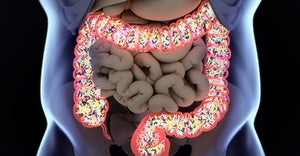Mast Cell Activation Syndrome (MCAS)

By Dr. David M. Brady and Danielle Moyer, MS
Mast Cell Activation Syndrome (MCAS) is a condition with newfound fame. MCAS first emerged in the 1980s, but has gained recognition and started to appear in the medical literature at a growing rate in the last decade [1]. It falls under the umbrella of mast cell activation diseases (along with systemic mastocytosis and mast cell leukemia) [2]. Such a new condition currently brings up more questions than answers, and more research is needed on diagnostic criteria, valid disease biomarkers, and treatment methods.
As a result, patients are searching for answers themselves about their chronic symptoms and suspected self-diagnosed MCAS. This has caused a rise of patient self-help groups on social media and lay literature surrounding MCAS. The size and discussion of these social media groups are “outpacing the science, which has led to controversy with regards to diagnostic criteria and treatment” [3]. Issues arise when individuals of these groups determine MCAS to be the cause of their complex systems, when they may be due to other conditions or diseases with similar symptomatology. Therefore, they may not be receiving or seeking the appropriate care and it is important to know the differences.
What is Mast Cell Activation syndrome?
To explain MCAS, we have to begin by answering: “what are mast cells?” Mast cells are involved in our body’s natural inflammatory response, protecting our body from injury, infection, bacteria, and allergic reactions. MCAS occurs when these mast cells are overproduced and/or when their activation is higher than what is necessary for the body [4]. The altered mast cell production causes complex, multisystem symptoms involving the gastrointestinal, skin, respiratory, neurologic, and cardiovascular system [3]. It may even cause certain individuals to go into anaphylactic shock for no apparent reason (a condition called idiopathic anaphylaxis) [4].
According to research, here are some of the classic symptoms of MCAS [3-6]:
- Gastrointestinal
- Abdominal pain and cramping
- Diarrhea
- Nausea
- Vomiting
- Abdominal bloating
- Gastroesophageal acid reflux
- Skin
- Flushing
- Hives
- Itching
- Respiratory
- Throat tightening sensation
- Stuffy nose and sinus irritation
- Difficulty breathing and wheezing
- Neurological
- Headache
- Brain fog
- Cardiovascular
- Feeling faint (without actually fainting)
- Heart palpitations
- Low blood pressure (hypotension)
These symptoms are worsened by predictable triggers, like certain foods, strong scents, temperature changes, stress, alcohol, or certain medications. Patients suffering from MCAS may need assistance in identifying their triggers and education on proper avoidance [3].
How do you get diagnosed with Mast Cell Activation Syndrome?
There are three criteria used when diagnosing a patient with MCAS in order to avoid misdiagnosis, as well as overgeneralization of clinical symptoms that a patient may exhibit [7].
The first criterion is display of the previously listed symptoms involving two or more organ systems at the same time. The symptoms must be recurring and/or chronic, independent of other conditions or disorders, and must require treatment or therapy [2,7].
The second criterion is the elevation of certain blood markers called serum tryptase or mast cell-derived metabolites while actively suffering from MCAS symptoms. Diagnostic markers in the blood vary, as increased MCAS symptoms may last for varied times (from hours to days to weeks). Patients who do not meet the laboratory criteria for MCAS may be considered to have “suspected MCAS”. These patients will receive trials of different therapies, but with ongoing testing for other conditions [2,7].
The third criterion relates to how MCAS is treated. If a patient responds positively to drugs that inhibit mast cell mediators or block mast cell release, this can fulfil the third co-criterion of a MCAS diagnosis [2,7].
How is Mast Cell Activation Syndrome treated?
There is no cure for MCAS, so an individual’s treatment plan is tailored to target their specific symptoms. As stated above, effective treatment for MCAS is considered to be a criterion for the diagnosis of MCAS [2,7]. If the patient's symptoms are decreased in frequency, severity, or goes away with the avoidance of known triggers, or with medications including H1 and H2 histamine receptor antagonists (blockers), anti-leukotrienes, or mast cell stabilizers, this can further support the diagnosis of MCAS [3].
What other conditions or diseases can Mast Cell Activation Syndrome be confused with?
MCAS is an incredibly complicated disorder that results in both common and unusual symptoms across many different body systems. That being said, it is easy to confuse symptoms caused by MCAS with those from other conditions or diseases, including:
- Systemic mastocytosis
- Systemic mastocytosis falls under the same umbrella as MCAS - “mast cell activation diseases.” Systemic mastocytosis results from genetic mutations and leads to an abnormal accumulation of mast cells in one or more organ systems, including the bone marrow, skin, and gastrointestinal tract. MCAS differs from systemic mastocytosis, although they do have similar presentations and symptoms [3].
- Irritable Bowel Syndrome (IBS)
- Patients with IBS have been shown to have increased mast cell activation in their intestines compared to healthy subjects. The difference between IBS and MCAS is that IBS symptoms are congregated and isolated in the gastrointestinal tract, whereas MCAS symptoms are in more than one organ system [3].
- Histamine Intolerance
- Histamine Intolerance is an imbalance of histamine (an amino acid compound in the body involved in local immune responses and inflammation) in the body and a reduced ability to process them. Symptoms of histamine intolerance mirror those of MCAS including headache, hypotension, facial flushing, diarrhea, nausea, vomiting, abdominal pain, congestion, and asthma. However, these symptoms only occur when eating histamine-rich foods in contrast to MCAS symptoms which can have various triggers [3]. Symptoms of histamine intolerance may also be reduced, or eliminated, by taking the histamine degrading enzyme diamine oxidase (DAO) with meals.
- Those with prominent gastrointestinal symptoms with suspected MCAS may also consider ruling out other inflammatory conditions like [3]:
- Celiac disease
- Eosinophilic Esophagitis (EoE)
- GI tract malignancies, or anatomic defects
- Small intestinal bacterial overgrowth (SIBO)
- Intestinal dysbiosis (an imbalance in gut microbes)
- Bile salt diarrhea, especially in those who have had abdominal surgeries, especially gallbladder removal (cholecystectomy).
- There are several chronic symptom disorders that may be confused with MCAS [3]:
- Chronic pain syndromes
- Chronic fatigue syndromes (CFS)
- Fibromyalgia (FMS/FM)
- Multiple chemical sensitivity syndrome (MCS)
- Chronic syndromes from infections or other exposures, such as chronic Lyme disease syndrome and/or other tick borne co-infections.
- Various auto-immune diseases
- Endocrinopathies
- Psychiatric conditions
Recent evidence suggests that there is a common familial occurrence of systemic mast cell activation diseases, meaning there may be a genetic component. If a family member has one of these diseases, your risk may be increased as well [8].
The Takeaway
Mast cell activation syndrome (MCAS) is an incredibly complex condition. Some research theorizes that the incidence and prevalence of MCAS may increase in relation to the increase of other allergic or hypersensitivity conditions [3]. However, more research is needed for improved recognition, diagnosis, treatment, and patient counseling of MCAS beyond the current social media “experts” and patient blogs. Although many patients out there have a large assortment of chronic, multisystem symptoms for seemingly unknown reasons, it is incredibly important to distinguish MCAS versus other diseases or conditions for proper treatment as more research is discovered.
References:
- Afrin LB, Ackerley MB, Bluestein LS, et al. Diagnosis of mast cell activation syndrome: a global “consensus-2.” Diagnosis. 2021;8(2):137-152. doi:10.1515/dx-2020-0005
- Frieri M. Mast Cell Activation Syndrome. Clinic Rev Allerg Immunol. 2018;54(3):353-365. doi:10.1007/s12016-015-8487-6
- Hamilton MJ, Scarlata K. Mast Cell Activation Syndrome – What it Is and Isn’t. PRACTICAL GASTROENTEROLOGY. Published online 2020:7.
- Akin C. Mast cell activation syndromes. Journal of Allergy and Clinical Immunology. 2017;140(2):349-355. doi:10.1016/j.jaci.2017.06.007
- Valent P. Mast cell activation syndromes: definition and classification. Allergy. 2013;68(4):417-424. doi:10.1111/all.12126
- Mast Cell Activation Syndrome (MCAS). American Academy of Allergy, Asthma & Immunology website. https://www.aaaai.org/conditions-treatments/related-conditions/mcas. Accessed July 2, 2021.
- Overview & Diagnosis. The Mast Cell Disease Society, Inc. website. https://tmsforacure.org/overview/. Accessed July 2, 2021.
- Molderings GJ, Haenisch B, Bogdanow M, Fimmers R, Nöthen MM. Familial Occurrence of Systemic Mast Cell Activation Disease. PLOS ONE. 2013;8(9):e76241. doi:10.1371/journal.pone.0076241
- David Brady







Comments 0